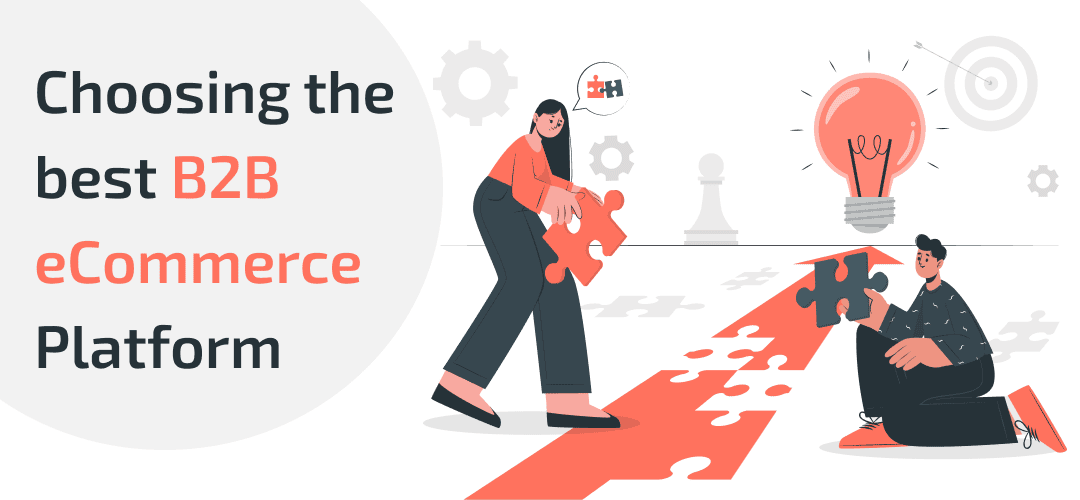
With eCommerce currently on the rise, online retailers focus not only on B2C marketplaces but also B2B websites, serving a smaller yet more payable customer base. If we’re to believe recent surveys, the B2B eCommerce sphere exceeds the value of B2C eCommerce by 6 times. For example, there are 630,000 distribution companies in the U.S. and their web sales reached $8.0 trillion in 2022 – the growth up to 20.4% from the previous year.
The main question is how to benefit from this expanding market? Well, to attain this end you’ll need robust tools. Modern B2B commerce companies utilize everything from self-service chatbots to ERP technologies to drive sales. However, the first and most crucial one is the best B2B eCommerce software that can be expanded with new features and add-ons.
A powerful B2B platform will provide you with everything you need, including marketing tools, analytics and a customized checkout experience to convert clients.
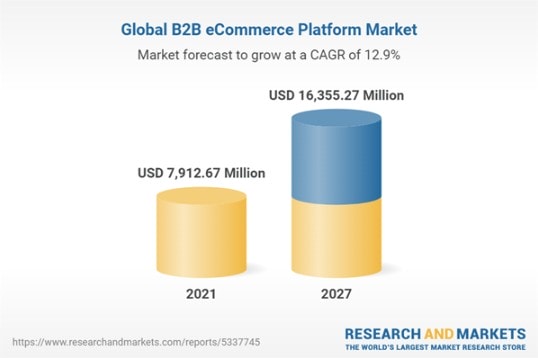
We’ve already addressed the basics of business-to-business eCommerce, different types of B2B eCommerce, B2B eCommerce website development, wholesale B2B eCommerce and other aspects of large online businesses. This guide will walk you through the best B2B eCommerce solutions, features to look for, and considerations to make.
What is a B2B eCommerce platform?
In a nutshell, a B2B eCommerce platform is one that facilitates eCommerce between business clients rather than between a business and a consumer (like in a more traditional B2C model). Its most popular types include software for manufacturers, distributors, wholesalers and B2B2C.
The main benefits of B2B eCommerce platforms are as follows: the ability to reach new customers; a better management of suppliers and customers; streamline and increase B2B eCommerce sales to existing clients; leverage big data and improve data analytics.
To make it easier for you, we’ve compiled a detailed table, with all the features and their role for eCommerce businesses.
| What features to look for? | Why are they so important? |
|---|---|
| Customization | eCommerce platforms should provide flexible and customizable options that can change and grow alongside a particular business they serve. For example, the open source code can be modified to make the software more robust or secure, as well as introduce additional features. The appeal of personalization seems to be growing as new practices like headless commerce gain prominence |
| Security | A B2B eCommerce system must be able to offer security for credit card data, customer data, fraud prevention, SSL certificates. These tools prevent websites from cyber attacks and help to increase SEO rankings, ensuring fast page speed and positive visitor behavior. |
| Third-party integration | Large companies employ a variety of B2B tools, such as ERP, PIM, CRM, CMS, etc. Full-fledged eCommerce platforms should offer a solution that unites all existing applications in a convenient package without restricting the overall functionality. A pluggable architecture won’t put you into a position where you invest time and money in an eCommerce platform incompatible with the software you already use. What’s more, a decent platform comes with a marketplace of B2B plugins in order to expand business activities and automate routine tasks. |
| Internationalization | Long-term and sustainable growth require the ability to sell worldwide. In order to sell into a new market, B2B merchants require the basic functions, such as payment methods, taxes, multi-currency and multi-language support. B2B eCommerce platform that offers internationalization, you have a service to grow with you and provide the flexibility to sell into new areas. |
| Multi-vendor | A B2B multi-vendor eCommerce system allows independent sellers to offer their goods in one place. It is an online marketplace with numerous stores maintained by multiple vendors. Since there are more merchants, multi-vendor marketplaces contain more products than single-vendor shops. In addition, multi-vendor marketplaces provide a better option for merchants who want to sell their goods online. |
| Mobile responsiveness | According to recent studies, up to 60% of B2B buyers use a smartphone to research a product before purchasing it. B2B mobile eCommerce should be in place for B2B transactions since business clients may communicate with vendors and suppliers more rapidly by having a mobile-responsive website. Let alone that SEO rankings also depend on a mobile presence. With a mobile eCommerce app, you can reach app users at any moment to inform them about sales using push notifications, in-app messages, and other methods. |
| Omnichannel | At various stages, customers use various sales channels, such as face-to-face interactions, video conferencing, online chat, and online marketplaces. Thus, 8 out of 10 B2B leaders believe that an omnichannel strategy is more effective than conventional methods. The most common omnichannel benefits include a wider reach of potential customers; better experience and buying journey for existing ones; access to better customer data; easier and faster business growth, etc. To attain these ends, the chosen platform must support multi-channel sales and third-party integrations. |
| Access Control List | Access Control Lists define the policies for granting or denying access to various data. Every user has a role, and each role is configured with a set of permissions that can be used to perform or limit actions. B2B businesses must manage what actions a user is allowed to perform – no matter whether a user is only allowed to access the most recent sales report, completely change a customer's order, or approve a payment. |
| Wholesale support | The growth of eCommerce greatly benefits B2B businesses, especially those selling in bulk. Even if a B2B company doesn’t work with wholesale retailers, it can expand in this direction, and the chosen platform must support the features of wholesale eCommerce. Here’re a few functions to consider: adaptable and responsive design, flexible payment methods and multi-tier prices, multi-channel data synchronization, etc. |
Top 7 B2B eCommerce platforms for mid- and large-size online businesses
Keep on reading to learn what makes each B2B eCommerce & wholesale platform unique and to determine which one would be the best option for your company.
Below, we share B2B eCommerce software reviews with you.
Note: The platforms below are not ranked but given in a random order. Each description showcases their stand-out features and B2B eCommerce technology. However, we strongly recommend that you test (or at least request a demo) any of these eCommerce software before making your final decision.
nopCommerce
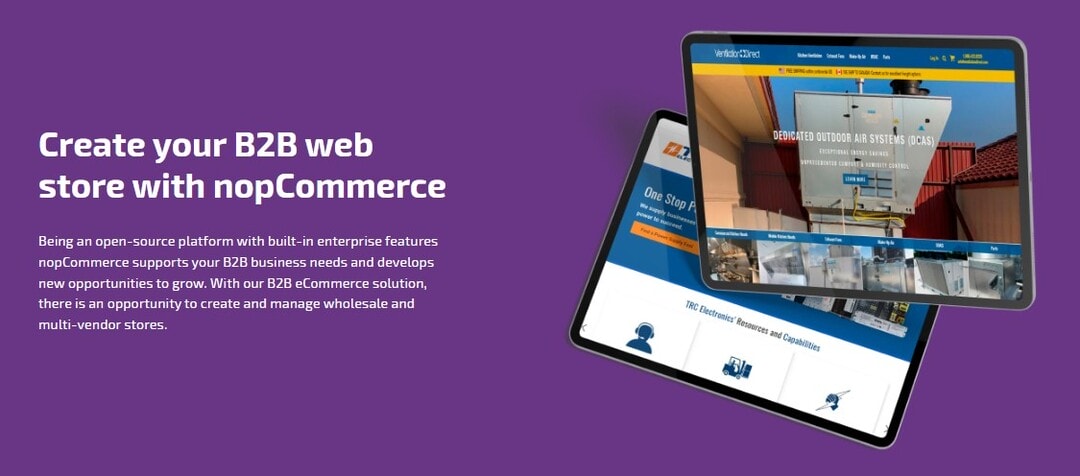
nopCommerce is the best open-source B2B eCommerce platform, whose free edition offers complete multi-vendor and multi-store support (unlike many of its competitors). This means that business owners don’t need to compromise rich functionality over the total cost of ownership. The software also features warehouse management and marketing options, and effortlessly integrates with payment and shipping systems.
The key features and functionalities of nopCommerce include:
- Unlimited customization. The flexible architecture and open-source code allows to customize the platform to any business model, processes, and relationships with suppliers and customers (whether they are manufacturers, wholesalers or distributors).
- High security. nopCommerce is built on the latest Microsoft technologies, supports web farms and asynchronous methods. Meeting all PCI and GDPR compliance requirements, as well as external authentication, the platform is suitable for large and mission-critical businesses.
- Scalability. The full compatibility with CRM, ERP, WMS and PIM systems helps the platform to expand together with business growth.
- Advanced wholesale tools. Unlimited product quantity; product attributes and their comparison; stock management; tier-pricing and “call for price”; multi-warehouse support.
- Order management and customer base. Build a seamless customer journey through an anonymous or one-page checkout. Create and configure client roles, as well as keep access control lists. Manage recurring payments and invoices. use various shipping features, including packaging slips, pickup points, shipping estimations and calculations.
- Pricing and tax automation. Integrate with popular payment methods. Categorize products and configure taxes by state. Built-in business analytics and reporting on the dashboard supported by Microsoft Power BI and others.
- Mobile commerce and native responsiveness. Help customers reach your website from any device as nopCommerce has a fully adaptable B2B eCommerce website design and a ready-to-use mobile app.
- Headless functionality. Provide a dynamic customer experience by separating the front-end and back-end of your B2B eCommerce website. The approach is realized through an application programming interface (API) via a RESTful API plugin to deliver and provide content.
As of today, more than 65,000 stores run on nopCommerce, including Volvo Cars, BMW Group, and Herbalife.
How much: nopCommerce is entirely free (including top B2B eCommerce features), without any transaction fees, monthly expenses, or hidden costs. However, there are some services that require additional payments, for example, premium three-month support or one-year support at $299 and $799, respectively. The headless approach is implemented through the Web API plugin (available at $850), which is still among the cheapest options in the industry.
Adobe Commerce (formerly Magento)
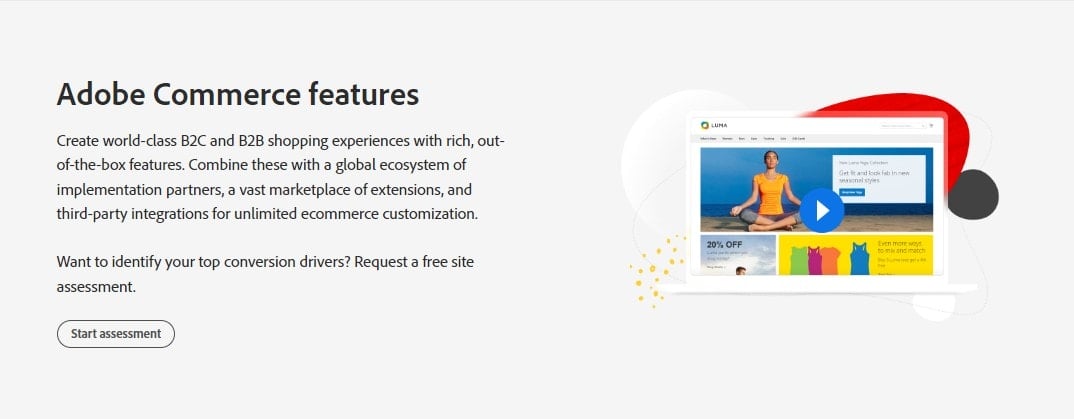
Adobe Commerce is a powerful B2B eCommerce platform with AI (to create personalized experiences and product recommendations) that offers a comprehensive solution for businesses that do retail and B2B sales online.
The platform also helps to manage multi-brand online stores, channel partners and key accounts. From the admin panel, B2B clients can set different tiers and custom permissions, monitor their credit, check order history and track quotes online. In addition, Adobe Commerce facilitates the development of B2B catalogs, order management, inventory and a quick checkout.
The only downside is that all these features (for example, multi-store and multi-vendor support) are available in the paid version, while its free open-source counterpart presents just a few capabilities and isn’t regularly updated.
How much: Adobe Commerce is quote-based, but the minimum price for running a B2B eCommerce website starts at $22,000 per year. The final price for the Enterprise edition also depends on the annual Gross Sales Revenue. Considering additional operating costs, the average price will be between $30,000 to $50,000 (with the final price without an upper limit).
BigCommerce
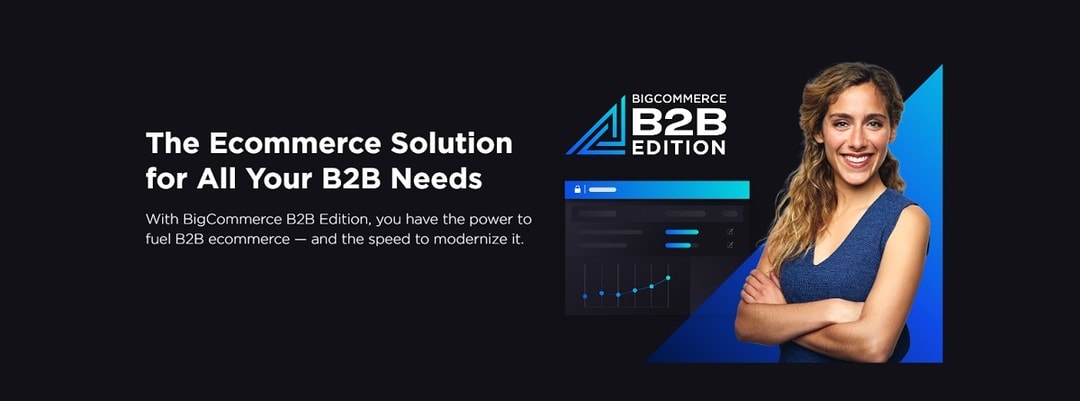
Under B2B Edition, BigCommerce offers a variety of B2B features and add-ons to ensure a smooth eCommerce experience. Website owners can set permissions and roles for buyers; offer multi-tier pricing, bulk discounts and promotions down to the SKU level; add, change, display or hide approved payment methods.
All this means that B2B clients will be able to choose from several payment alternatives, easily manage and pay their invoices online; instantly browse and reorder all prior items; add goods to the cart and send an automatic quote request.
What’s more, this B2B wholesale platform supports headless commerce, i.e. allows to combine the front-end and back-end of an online store. This approach is beneficial for large businesses that need flexibility (design or structure changes due to the emergence of new technologies) and scalability (multiple languages, multiple countries, and multiple currencies). In combination, it guarantees greater personalization across all channels.
How much: For the needs of B2B purposes, a minor version is the Pro Plan. It costs $299.95 per month, with the annual sales limit at $400,000. For those who need a bigger scale, there is the Enterprise Edition. Its cost is available upon request and the limit is negotiable, but you could easily pay over $1000/mo + a revenue-based fee.
Shopify Plus
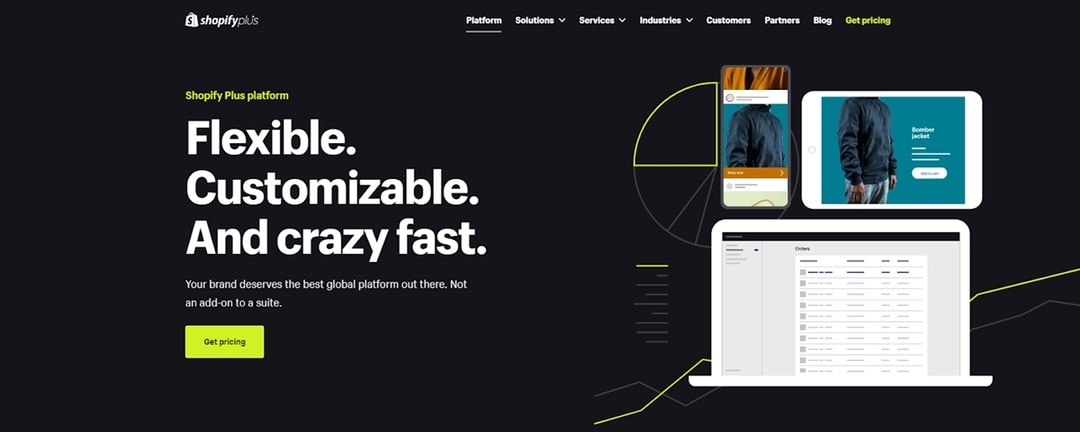
Shopify B2B eCommerce combines the best features of Shopify and advanced functions into a platform providing B2B eCommerce services for high growth merchants and brands. With the help of Shopify Plus, mature businesses can automate typical sales procedures for retail, direct-to-consumer, B2B, and wholesale clients.
For busy B2B business owners, Shopify provides a versatile and time-saving administration solution by letting them update and manage all crucial data from a single dashboard. Along with client-specific pricing, there are tools to build password-protected storefronts; run multiple eCommerce websites from the same backend; ensure flexible payment methods; integrate with third-party apps, etc.
Although B2B functionality is a vital component of the Shopify platform, the wholesale channel is available only in Shopify Plus. This means that your business should scale keeping in mind the restrictions and higher costs of the senior version.
How much: This B2B eCommerce platform cost starts at $2,000 per month and can go up to $40,000 per month. Additionally, Shopify Plus pricing switches from a subscription-based model to a revenue-based cost and charges 0.25% of monthly income once merchants reach $800,000.
Oracle NetSuite
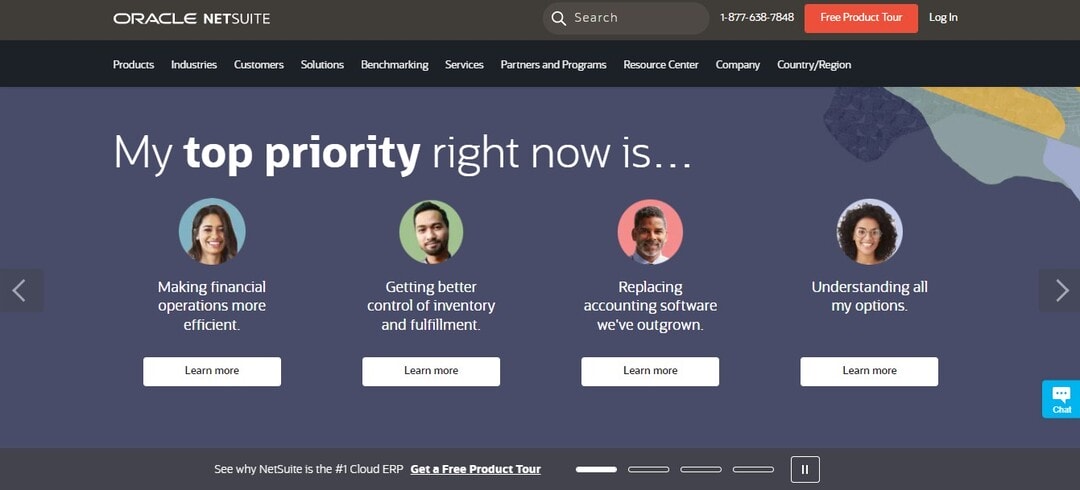
Although NetSuite tends to focus on medium-sized businesses, it can also fit the requirements of many enterprises. This B2B eCommerce application helps to offer consumers unique pricing, credit limits, and purchase terms. New and potential clients can get price quotes directly from a website page and convert the quote into an online order without picking up the phone.
With NetSuite, B2B ordering, billing and invoicing are simple. Users can check their unpaid balances, extra funds, active credit memos, and terms agreed upon with current accounts. They can enter partial or full payments for any bills that still have a balance due and view in detail all of their invoices using the system.
A webshop powered by NetSuite is integrated with native order and inventory management systems, ERP and CRM. This unified source of data allows merchants to provide a more consistent and relevant customer experience while streamlining operations, better managing suppliers and stocks, expediting fulfillment, and enhancing service.
How much: NetSuite would have been one of the best eCommerce platforms for B2B, but its functionality is scattered across different modules and applications that come at an additional cost. For example, the ERP edition starts at $999 per month, while the Mid-Market Edition (including both CRM and ERP) starts at $2,499 per month. Simply put, most NetSuite implementations will cost between $25,000 to $100,000.
WooCommerce B2B
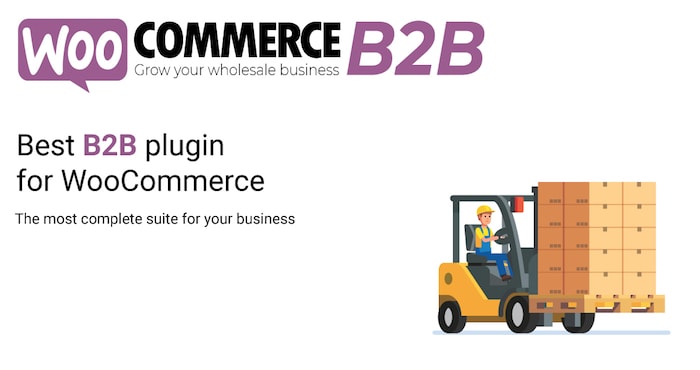
WooCommerce is yet another open-source B2B shopping cart that can be expanded with advanced features through an all-in-one plugin. Thus, WooCommerce B2B unlocks more capabilities in relation to shopping journeys, payments and shipping methods, order management, etc.
These extensions add the following functionalities: separate and extended B2B registration; user roles and customer groups; hidden prices and stocks; prices by quantity and bulk discounts; access restrictions; payment, tax and shipping control; advanced admin filters; data analytics and export; REST API support; multi-language, and a number of other features.
While such a plugin-based architecture has a strong advantage, it might still cause some disruptions in the overall workflow. Not all plugins are compatible with each other, and require regular updates. In case a live store is getting expanded with the B2B plugin, this process can affect the functioning of those extensions that had been applied before.
How much: Initially, WooCommerce is free, with its B2B functionality launched through several plugins. Each of them comes at their own price and can have overlapping features. Starting from one-time payments to subscription-based models, prices vary from $69 to $149 (Note that the functionality available differs for various suites and can be short of more powerful capabilities).
Shift4Shop (formerly 3dcart)
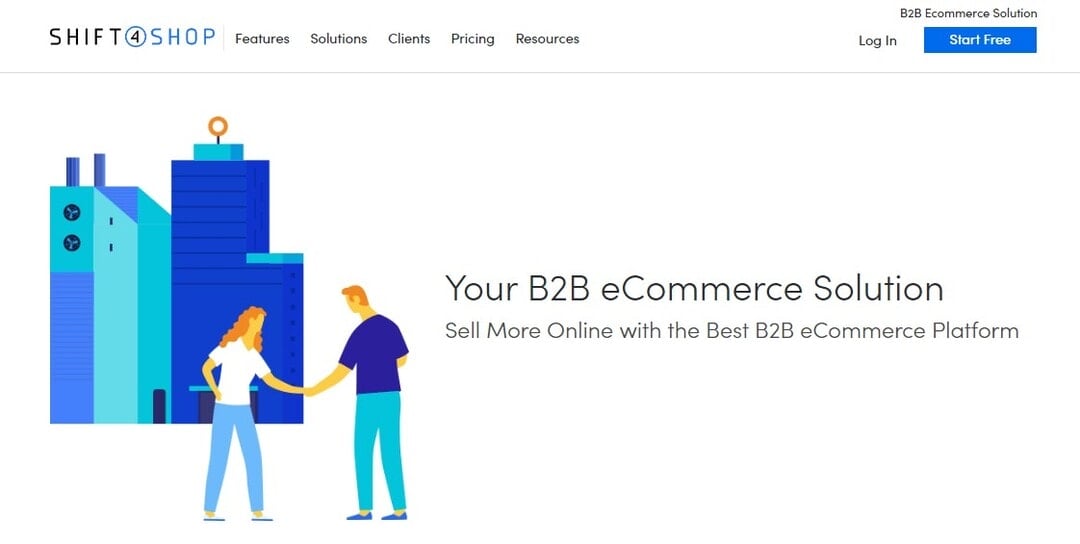
Shift4Shop is a B2B eCommerce website builder to assist wholesalers, resellers, manufacturers or any other type of B2B suppliers, and provide them with the shopping experience they require.
One of the best features is customer segmentation to classify consumers depending on the products they buy and the volume of their orders. Thus, it’s possible to offer specific products like webinars or premium content. To ensure the highest possible revenue from existing clients, store owners can even hide bulk pricing from competing customers.
Other B2B features of Shift4Shop include a mobile-friendly interface, additional integrations, wholesale pricing and custom portals, a number of free B2B eCommerce templates, one-click reorder and subscription, automated product quantity discounts, flexible tax management, and multiple payment processors.
How much: The Pro plan is the most suitable for B2B sales and starts from $229 per month. The only limit is up to $1 million in sales. For a larger business scale, it’s better to contact Shift4Shop directly for pricing information.
Wrapping Up
There are many great B2B eCommerce platforms on the market today, and they all offer something special for business owners. Since all businesses have unique requirements, it conditions their choice of a suitable platform. That’s why we've reviewed the best options and narrowed your choices to a few candidates in our B2B eCommerce platform comparison.
There are some that can be considered the best eCommerce platform for manufacturers, the best eCommerce platform for wholesale or the best eCommerce platform for B2B2C sales. Others have powerful CRM and ERP features, dozens of apps and add-ons, or freedom to adapt to any business needs.
When choosing a B2B ecommerce platform to use, ask yourself which features matter most to you and why they are so important.
- What can we accomplish with a B2B eCommerce platform?
- What are our current goals for using this solution?
- What will our goals be in three years from now?
Respond to these questions, follow the latest B2B eCommerce trends and it won’t be an unsolvable challenge to find the right B2B eCommerce platform for your business.